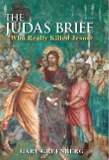Authors get blamed for a lot of things by readers, often deservedly so, but not always. Take the question of book titles. In academic publishing obtuse, boring, or incomprehensible titles are common, and the authors are well fitted to the task of selecting such works. In commercial trade publishing, however, the emphasis is on making money and the zingier the title the better. This leaves authors in something of a muddle. Having set out to inflict their work on the public they spend many hours thinking about just the right title to convey what they have written about, but publishers often disagree with the author's choice and change the title, frequently without telling him or her.
My first book on biblical history, a study of the Exodus from Egypt in which I argued for an Egyptian origin of Israel in connection with the monotheistic Pharaoh Akhenaten, was originally called "The Exodus Enigma." That was the title in my contract. I thought it was a pretty good and provocative title that should catch the reader's eye. When I got the galleys for final corrections I learned that the book was now called "The Moses Mystery: The African origins of the Jewish people." I don't think the word "Africa" appeared anywhere in my book but the publisher rightly recognized that there could be a strong market for this book in the African-American community and they were right. In Afrocentric circles ancient Egypt is identified as a nation of black Africans. One of the chief early Israelites in Moses' retinue was Phineas, and Phineas is a name meaning the Nubian.
Now, I don't have a personal position on the ethnic makeup of ancient Egyptians. It's not my field. And if the ancient Egyptians were black, that's okay with me. But I didn't have that perspective in writing the book. I was only interested in the intellectual side of the equation. What were the intellectual roots of ancient Israel and it was clear, to me at least, that much of it lay in Egypt. (I'll blog on some of that at a later time.)
If that title change wasn't enough of a shock, when the paperback edition came out I learned for the first time that the title had been changed again. Now it was called "The Bible Myth: The African origins of the Jewish people." To be frank, I have no idea what the front part of the title means as a description of my book's contents, but it apparently has a good key word makeup for on-line searches. (The editor who made the change, however, hadn't considered that aspect of the name change at the time.)
One of my later books was a biography of King David that challenged the conventional image of David as a popular beloved Israelite king. My working title for the book was "David versus Israel: the rise and fall of the United Monarchy." That title captured my sense of what the book was about and i thought it was quite controversial, raising a new perspective that one didn't see before. The publisher, however, thought "sin" was a hot topic, so when the galleys came out I now learned that the title was changed to "The Sins of King David: A New History." I thought it was a pretty bland title that offered the reader little guidance as to the book's contents. I just assumed everyone would assume it was another book about David and Bathsheba, when I had so many more important things to say. Unfortunately, the book was released in the midst of an avalanche of David biographies with similar titles, like "David's Demons" and so forth.
I was particularly proud of the title I picked for my latest book. My title was "The Judas Brief: A critical investigation into the trials of Jesus and the role of the Jews." I thought that was quite provocative and conveyed the scope and controversy in the book. When negotiating my contract I wanted to have a clause prohibiting a title change without my permission. The editor at the time assured me that such a clause wasn't necessary because everyone loved the title just as I had it. So, I let it drop.
A few weeks ago, I did a Google search on "The Judas Brief". (I told you I was obsessive-see my previous post.) I was curious if any kind of word was around anywhere. One hit popped up for the book title, a Japanese site affiliated with Amazon, and to my surprise, the title had been changed to "The Judas Brief: Who really killed Jesus?" Shortly thereafter, I found it on Amazon's own site and sure enough, that confirmed the book change. Is it a more commercial title? I don't know. I still like mine better, but I'm in the book-writing not book-selling business. But, my book is more about who didn't kill Jesus than who did. Still, I do name the person I believe responsible for having Pilate execute Jesus (not one of the usual suspects) so the title isn't really deceptive.
So, I'm just an author. Don't blame me for a book's title.
Subscribe to:
Post Comments (Atom)



1 comment:
Interesting read (especially as someone who hasn't published a book yet). I will say that on the last one, though, the publisher's title does roll off the tongue a little easier.
It looks like you've had several publishers. Are there any publishers that are known for being more author friendly with titles?
Post a Comment